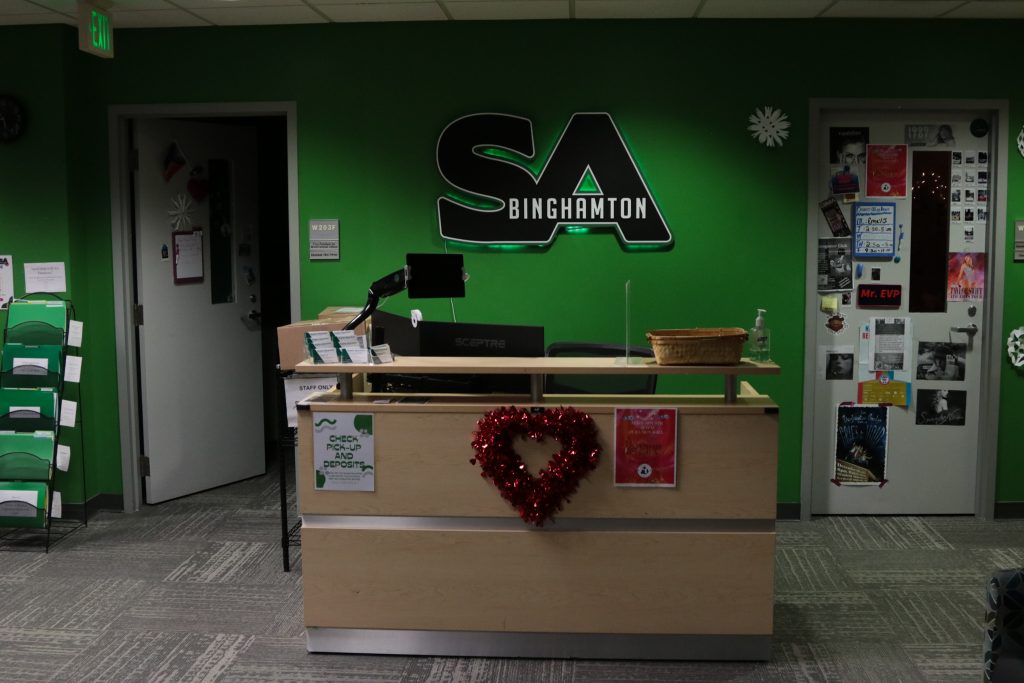Amid budgetary concerns, Binghamton University’s Student Association (SA) is putting a “soft cap” on the number of clubs chartered this semester.
Chance Fiorisi, the executive vice president (EVP) and a junior majoring in political science and Daniel Croce, the vice president of finance (VPF) and a senior majoring in business administration, announced the internal limitation on the number of clubs eligible to be chartered this semester at last week’s SA Congress meeting. According to Fiorisi, this is not meant to stop community building on campus, but rather for the SA’s Internal Affairs (IA) committee to be more mindful of clubs they choose to charter.
It will not affect a previous amendment that streamlined the process of chartering clubs.
“[SA] is granting clubs more money than ever before, thanks to the works of [Croce] and we want to keep that going,” Fiorisi wrote in an email. “Last semester and the semester before, we chartered more clubs than at any time in the past [five] years. Thirteen clubs were chartered [this] semester alone and 24 the semester before … there is never a question of whether or not we are chartering too many clubs, but rather are we chartering clubs that are sustainable.”
The club chartering streamlining amendment was instituted last year, creating office hours for student organization representatives to meet with the EVP. Previously, clubs would have to present to the IA committee for a provisional charter, only able to return for a full charter one calendar year later. The amendment cut the IA committee out of the final step, creating a direct line of communication between the EVP and student organizations, which led to more chartering requests, while simultaneously cutting back on the wait between the provisional and full charter presentation.
“So far this semester, the number of clubs asking to be chartered has not reached the soft cap, so I don’t foresee it being a problem,” Batia Rabin, the chair of the IA Committee and a sophomore majoring in philosophy, politics and law, wrote in an email. “This will not affect the policy from last year about a more streamlined chartering process because that had to do with the full charter and the EVP’s office, and the soft cap has to do with provisional chartering and the IA Committee. IA will just be a little more selective when chartering.“
According to Fiorisi, four clubs chartered last year will lose their status, because they did not reregister or transition their E-Board. With a focus on chartering sustainable clubs, the SA is looking to hold a training session in the spring to foster more successful transitions.
Ella Botticelli, a sophomore majoring in philosophy, politics and law, helped to found a new organization called The Women in Law Association (WILA). As they began the chartering process, Botticelli expressed concern with the IA’s new selective chartering policy.
“Firstly, many of our founders will be graduating in the spring of 2025 and bringing in a new group of members to finish our chartering process would be difficult,” Botticelli wrote in an email. “Also, our recent general interest meeting had a positive turnout, indicating the significance of this club at [BU]. Obtaining a charter would greatly facilitate our ability to plan events and streamline the organization of general body meetings. I sincerely hope that this ‘soft cap’ does not hinder WILA from obtaining a charter. Women have historically been excluded from many academic fields, including law, and we still see the implications of that today.”
Last spring, the SA cleared three years of chartering backlog, removing 42 organizations from the list that were still waiting to be heard by the IA committee. With the new chartering amendment, the EVP and the IA Committee now work together on meeting with student organization representatives.
Hannah Yeddu, founder of BU’s Eating Disorder Awareness Club and a junior majoring in biology, expressed similar concerns about the chartering soft cap.
“The decision also brings attention to the transitional issues faced by some clubs, leading to their dechartering,” Yeddu wrote in an email. “This seems a bit unfair, as these clubs had previously met the criteria for chartering. It raises questions about the potential challenges others might face in maintaining their chartered status. While I appreciate SA’s internal mindfulness in processing clubs, the soft cap might affect the pace of our organization’s chartering process. It creates a sense of competition among new clubs vying for a limited number of charters this semester.”



